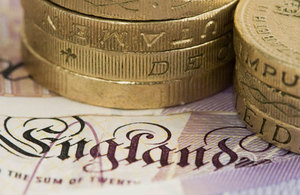HM Treasury analysis shows leaving EU would cost British households £4,300 per year (Archived)
Britain will be worse off by £4,300 a year per household if Britain votes to leave European Union, new analysis published today (18 April 2016) by the Treasury shows.

Coins
Visiting the National Composites Centre in Bristol, with other members of the Cabinet, Chancellor George Osborne presented what he called one of the most significant interventions to date in the EU referendum campaign: the first piece of economic analysis from the Treasury.
Using a negotiated bilateral agreement like Canada as the central assumption for the alternative, Britain would be worse off by the equivalent of £1,800 every year for every man, woman and child in Britain after 15 years, and overall GDP would be lower by 6.2%. Other options being proposed would be worse still.
There would also be a significant hit to tax receipts, equivalent to an 8p increase in the rate of income tax.
The analysis provides a rigorous and objective economic analysis of the long term impact of remaining a member of the EU compared to the alternatives:
- membership of the European Economic Area (EEA), like Norway
- a negotiated bilateral agreement, such as that between the EU and Switzerland, Turkey or Canada
- World Trade Organisation (WTO) membership without any form of specific agreement with the EU, like Russia or Brazil
The Treasury’s analysis models each of these alternatives and concludes that Britain’s economy would become less open in each, compared to remaining within the EU. All would lead to lower trade and investment. This reduced openness would lead to lower productivity and ultimately feed through into lower wages and living standards for working people, leaving the country permanently poorer.
Today’s document concludes that Britain’s membership of the single market has significantly increased trade and made Britain one of the top global destinations for foreign direct investment. Almost three-quarters of foreign investors cite access to the single market as a reason for their investment in the UK.
The benefits come from the unique nature of the single market which not only removes tariffs and quotas, but also creates a customs union which reduces cross-border costs and reduces non-tariff barriers to trade such as regulations, standards and specifications which are the most significant impediment to trade for advanced economies like the UK.
The document also shows that once all trade deals currently under negotiation are completed, more than 80% of UK trade will be with either the EU or through EU free trade agreements.
The single market is particularly important to the UK given the nature of its economy, with services accounting for almost 80% of GDP. Both the services industry and advanced manufacturing are reliant on cross-border trade and supply chains. Furthermore, it is estimated that 3.3 million jobs are linked to exports from the UK to other EU countries.
The analysis finds that the annual loss of GDP per household after 15 years under the three proposed models for an alternative to EU membership would be as follows:
- £2,600 in the case of EEA membership
- £4,300 in the case of a negotiated bilateral agreement
- £5,200 in the case of WTO membership
The analysis also finds that the negative impact on GDP would result in substantially weaker tax receipts. This would significantly outweigh any potential fiscal gain from reduced financial contributions to the EU, which are a little over 1p for every £1 of tax paid once the UK’s rebates and receipts are taken into account. The result would be higher government borrowing, large tax rises or major cuts in public spending.
The Treasury estimates that the central net effect on tax receipts under each scenario would be as follows:
- £20 billion in the case of EEA membership
- £36 billion in the case of a negotiated bilateral agreement
- £45 billion in the case of WTO membership
There would be no incentive, and it would not be in their interest, for the remaining EU countries to provide the UK a better deal than any of the existing alternatives or a better deal than they themselves have. To allow the UK to access the single market without agreeing to the rules of the single market would put their own businesses and consumers at a disadvantage.
Chancellor George Osborne said:
In a little over two months’ time, the people of the United Kingdom will decide whether our country should remain in the European Union or leave it. It’s the biggest decision in a generation and will have profound consequences for our economy, for living standards and for Britain’s role in the world.
But what many people are saying at the moment is that they don’t have enough facts and information to make an informed decision. That’s why today the government is publishing a rigorous analysis of the long term economic impacts of EU membership and the alternatives.
The analysis shows that a vote to leave would mean Britain would be permanently poorer, to the tune of £4,300 a year for every household. Under any alternative, we’d trade less, do less business and receive less investment. And the price would be paid by British families. Wages would be lower and prices would be higher.
Leaving the EU would be the most extraordinary self-inflicted wound.
The Treasury is expected to produce further analysis on the short-term implications of leaving the EU ahead of the referendum on 23 June 2016.